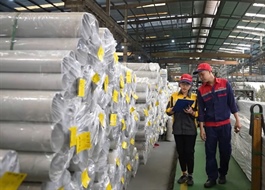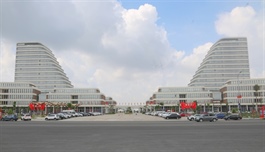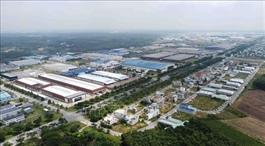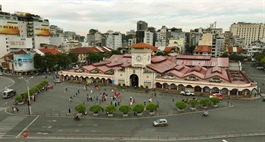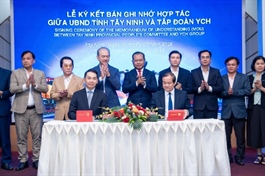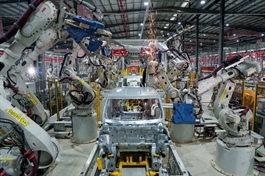Slow admin processes still hinder enterprises
Slow admin processes still hinder enterprises
Vietnam is being urged to provide enterprises and investors with a stronger business climate, with slow progress in some areas preventing the economy from hitting desired growth.
According to the World Bank’s report on Vietnam’s institutional breakthroughs for a high-income future released in June, many of Vietnam’s most pressing problems are institutional in nature.
“Despite waves of reform, firms in Vietnam continue to complain about the burden of administrative procedures (APs),” the World Bank stated. “Public investment processes are more organised than in the past, but are slow and rigid and do not adjust well to changing circumstances. Decentralisation has allowed provinces more control over their spending but has also led to wasteful competition between provinces, underproviding some infrastructure and over-providing other infrastructure.”
Moreover, laudable efforts to improve the lawmaking process have brought some positive results, but the process can still be slow and is not fully implemented. Efforts to reduce corruption, long known to be a problem, have taken hold and shifted perceptions but have also left many decision makers reluctant to make decisions, the report added.
The World Bank underlined that enterprises need a predictable and easy-to-comply-with legal and regulatory environment to grow.
“The legal and regulatory system is relatively stable in Vietnam, but APs continue to proliferate, and laws and regulations are inconsistently applied, reflecting both the quality of regulations and implementation arrangements,” it said. “The reaction of firms to a shifting regulatory environment is to avoid complying with the regulations. Rationalising the legal and regulatory framework can not only help to unleash business activity, it can also lead to more effective regulations.”
According to the Administrative Procedure Control Agency (APCA) under the Government Office, currently the total costs for individuals and enterprises to carry out APs annually is $4.8 billion, which is deemed too high.
There are now nearly 9,000 business conditions, of which 2,700 are expected to be removed before the end of 2026. In addition, there are almost 4,400 procedures related to production and business activities, just over 3,000 on goods types and products subject to specialised examination, over 850 on standards and criteria related to the implementation of production and business procedures, and 640 on report regimes.
In the first five months of this year, 18 business conditions were reduced and simplified, 36 APs were decentralised, and 69 electronic APs related to population management were simplified. This has raised the total number of procedures simplified and cut since 2021 to nearly 3,250, which is around 20 per cent of the regulations required to be eradicated or simplified across 275 documents.
The government has set a target that for the economy to grow 8 per cent or more this year, one of the prime tasks is to simplify and cut APs – meaning annulling at least 30 per cent of business-related conditions; cutting processing time for APs and compliance costs by at least 30 per cent; ensuring all business-related procedures are conducted online in a transparent and efficient manner with minimal paperwork; and enabling all procedures to be handled regardless of provincial administrative boundaries.
Many National Assembly (NA) deputies, like Ha Sy Dong representing the central province of Quang Tri, have expressed great concern over cumbersome APs in the domestic business and investment climate.
“I feel quite anxious about the slow improvement, and I have even reported that the reform process is slowing down,” Dong said. “I have met with many enterprises, and they said that they have been facing lots of administrative obstructions.”
Many do not want to operate as enterprises but as business households, which are subject to simpler procedures, Dong added.
“Though there are many resolutions in favour of enterprises, they still lament over APs. If we don’t implement a practical revolution in the business climate, small improvements as reported by the APCA will be of no avail, and the high economic growth goal will be difficult to reach,” Dong said.
At the NA’s recent ninth session, it was reported that many sub-licences and more investment and business conditions are being created, rather than being removed.
For example, previously, a 2010 decree on rice businesses and exports required many strict conditions for the trade, which were massively reduced in a 2018 decree on the same content.
However, a new amendment to the latter decree now requires businesses to own warehouses and not rent them, which many NA deputies noted as unsuitable.
Under a recent report from the Vietnam Chamber of Commerce and Industry, provincial competitiveness rankings and the flow of business laws indicate that investing in projects using land in Vietnam is like “a jungle of procedures”, from applying for construction planning and land use planning to investment policy approval, design appraisal, environmental matters, construction permits, and much more.
The report also noted that accessing land or building factories is increasingly difficult. If in 2021, 55 per cent of businesses had favourable access to business premises, by 2024, the rate had reduced to only 33 per cent due to prolonged procedures, especially land price determination procedures. Most of the procedures are longer than prescribed, or have to be carried out over and over again.
The NA acknowledged that cumbersome APs will continue to make it difficult to mobilise private investment for national economic growth. It is calculated high growth may be achieved with a private investment ratio of over 40 per cent.
Deputies also suggested the government soon establish a taskforce whose members are economic and legal experts in order to help boost administrative reform.

A big focus has been cutting admin procedures for all sorts of companies, but legal snags persist, Photo: Le Toan |
Paulo Medas, mission chief for Vietnam International Monetary Fund
The Vietnamese economy rebounded strongly in 2024, growing at 7.1 per cent backed by robust exports, resilient foreign direct investment, and supportive policies. This momentum continued into the first quarter of 2025, with economic activity expanding by 6.9 per cent on-year. Inflation remained contained. The current account surplus reached a record 6.6 per cent of GDP in 2024.
The outlook is heavily dependent on the outcome of trade negotiations and is constrained by elevated global uncertainty on trade policies and economic growth. Our projections, in line with our World Economic Outlook in April, assume high tariffs take effect in the third quarter. In such a scenario, economic growth is projected to slow to 5.4 per cent in 2025 and decelerate further in 2026. However, if global trade tensions subside, the economic outlook would improve significantly.
Downside risks are high. A further escalation in global trade tensions or a tightening of global financial conditions could weaken further exports and investment. Domestically, financial stress could re-emerge from tighter financial conditions and high corporate indebtedness. On the upside, achieving non-discriminatory trade agreements and successfully implementing planned infrastructure and structural reforms could significantly boost medium-term growth.
Given the uncertain outlook, policy priorities should focus on preserving macro-financial stability while navigating economic adjustments. Fiscal policy, supported by low levels of public debt, should take the lead in cushioning the near-term impact, especially under downside scenarios. Accelerated implementation of public investment and strengthening social safety nets would be important.
Monetary policy has much more limited room and should be decisively focused on anchoring inflation expectations. Allowing the exchange rate flexibility will be critical as the economy adjusts to the external shock. Some monetary easing could be considered if global interest rates decline as expected and inflation falls.
Vigilance is needed to monitor and act against inflation pressures that may arise, including due to external shocks. These challenges underscore the importance of modernising the monetary policy framework to enhance its effectiveness and anchor stability, including by replacing credit growth limits with an improved prudential framework.
Further efforts are needed to strengthen financial sector soundness. To bolster banking system resilience, priorities include strengthening bank supervision, building liquidity and capital buffers, and further improving the bank resolution framework.
The government’s plans for an ambitious reform agenda are very welcome and could boost medium-term growth, but implementation will be key. The government’s focus on institutional reforms to enhance efficiency, strengthen private sector development, and plans to scale up public investment is a major step forward. It will be important to develop and implement concrete reforms to improve key infrastructure as well as the function of capital markets, education and training, and productivity.
To maximise the return on large investments, it is critical to strengthen public investment management and adopt a sound macro-fiscal strategy to preserve the health of public finances. Efforts to strengthen economic governance are essential, including strengthening anti-money laundering and combating the financing of terrorism, and efforts in this regard are welcome.
Vietnam’s rapid economic growth is outpacing the development of its economic statistics, and urgent efforts are needed to close data gaps to support effective policymaking and risk management.
- 10:10 15/07/2025








